
DeepResearch
Tongyi Deep Research, the Leading Open-source Deep Research Agent
Stars: 14855
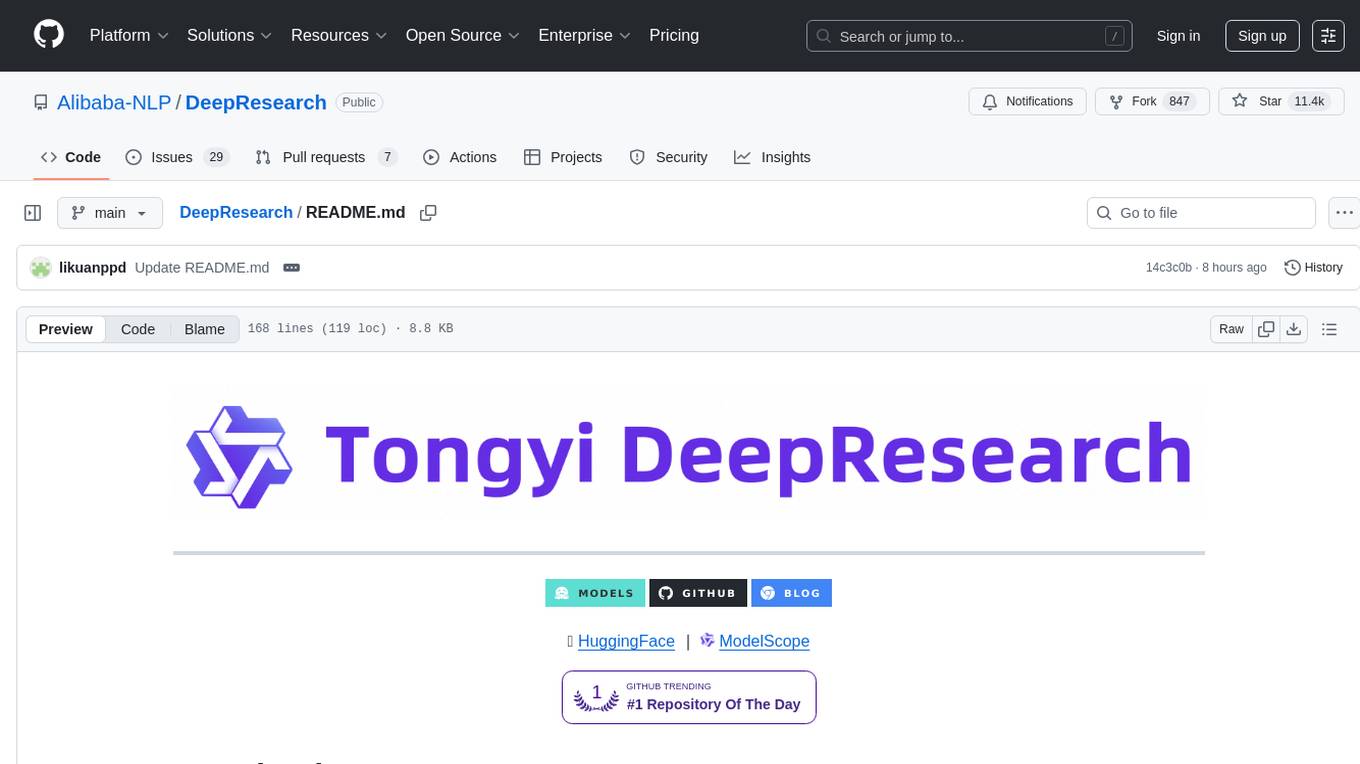
Tongyi DeepResearch is an agentic large language model with 30.5 billion total parameters, designed for long-horizon, deep information-seeking tasks. It demonstrates state-of-the-art performance across various search benchmarks. The model features a fully automated synthetic data generation pipeline, large-scale continual pre-training on agentic data, end-to-end reinforcement learning, and compatibility with two inference paradigms. Users can download the model directly from HuggingFace or ModelScope. The repository also provides benchmark evaluation scripts and information on the Deep Research Agent Family.
README:
🤗 HuggingFace |
 ModelScope | 💬 WeChat(微信)
ModelScope | 💬 WeChat(微信)
👏 Welcome to try Tongyi DeepResearch via our  Modelscope online demo or 🤗 Huggingface online demo or
Modelscope online demo or 🤗 Huggingface online demo or  bailian service!
bailian service!
[!NOTE] This demo is for quick exploration only. Response times may vary or fail intermittently due to model latency and tool QPS limits. For a stable experience we recommend local deployment; for a production-ready service, visit
bailian and follow the guided setup.
We present  Tongyi DeepResearch, an agentic large language model featuring 30.5 billion total parameters, with only 3.3 billion activated per token. Developed by Tongyi Lab, the model is specifically designed for long-horizon, deep information-seeking tasks. Tongyi DeepResearch demonstrates state-of-the-art performance across a range of agentic search benchmarks, including Humanity's Last Exam, BrowserComp, BrowserComp-ZH, WebWalkerQA,xbench-DeepSearch, FRAMES and SimpleQA.
Tongyi DeepResearch, an agentic large language model featuring 30.5 billion total parameters, with only 3.3 billion activated per token. Developed by Tongyi Lab, the model is specifically designed for long-horizon, deep information-seeking tasks. Tongyi DeepResearch demonstrates state-of-the-art performance across a range of agentic search benchmarks, including Humanity's Last Exam, BrowserComp, BrowserComp-ZH, WebWalkerQA,xbench-DeepSearch, FRAMES and SimpleQA.
Tongyi DeepResearch builds upon our previous work on the
WebAgent project.
More details can be found in our 📰 Tech Blog.
- ⚙️ Fully automated synthetic data generation pipeline: We design a highly scalable data synthesis pipeline, which is fully automatic and empowers agentic pre-training, supervised fine-tuning, and reinforcement learning.
- 🔄 Large-scale continual pre-training on agentic data: Leveraging diverse, high-quality agentic interaction data to extend model capabilities, maintain freshness, and strengthen reasoning performance.
- 🔁 End-to-end reinforcement learning: We employ a strictly on-policy RL approach based on a customized Group Relative Policy Optimization framework, with token-level policy gradients, leave-one-out advantage estimation, and selective filtering of negative samples to stabilize training in a non‑stationary environment.
- 🤖 Agent Inference Paradigm Compatibility: At inference, Tongyi DeepResearch is compatible with two inference paradigms: ReAct, for rigorously evaluating the model's core intrinsic abilities, and an IterResearch-based 'Heavy' mode, which uses a test-time scaling strategy to unlock the model's maximum performance ceiling.
You can directly download the model by following the links below.
| Model | Download Links | Model Size | Context Length |
|---|---|---|---|
| Tongyi-DeepResearch-30B-A3B |
🤗 HuggingFace 🤖 ModelScope |
30B-A3B | 128K |
[2025/09/20]🚀 Tongyi-DeepResearch-30B-A3B is now on OpenRouter! Follow the Quick-start guide.
[2025/09/17]🔥 We have released Tongyi-DeepResearch-30B-A3B.
This guide provides instructions for setting up the environment and running inference scripts located in the inference folder.
- Recommended Python version: 3.10.0 (using other versions may cause dependency issues).
- It is strongly advised to create an isolated environment using
condaorvirtualenv.
# Example with Conda
conda create -n react_infer_env python=3.10.0
conda activate react_infer_envInstall the required dependencies:
pip install -r requirements.txtConfigure your API keys and settings by copying the example environment file:
# Copy the example environment file
cp .env.example .envEdit the .env file and provide your actual API keys and configuration values:
- SERPER_KEY_ID: Get your key from Serper.dev for web search and Google Scholar
- JINA_API_KEYS: Get your key from Jina.ai for web page reading
- API_KEY/API_BASE: OpenAI-compatible API for page summarization from OpenAI
- DASHSCOPE_API_KEY: Get your key from Dashscope for file parsing
- SANDBOX_FUSION_ENDPOINT: Python interpreter sandbox endpoints (see SandboxFusion)
- MODEL_PATH: Path to your model weights
- DATASET: Name of your evaluation dataset
- OUTPUT_PATH: Directory for saving results
Note: The
.envfile is gitignored, so your secrets will not be committed to the repository.
The system supports two input file formats: JSON and JSONL.
Option 1: JSONL Format (recommended)
- Create your data file with
.jsonlextension (e.g.,my_questions.jsonl) - Each line must be a valid JSON object with
questionandanswerkeys:{"question": "What is the capital of France?", "answer": "Paris"} {"question": "Explain quantum computing", "answer": ""}
Option 2: JSON Format
- Create your data file with
.jsonextension (e.g.,my_questions.json) - File must contain a JSON array of objects, each with
questionandanswerkeys:[ {"question": "What is the capital of France?", "answer": "Paris"}, {"question": "Explain quantum computing", "answer": ""} ]
Important Note: The answer field contains the ground truth/reference answer used for evaluation. The system generates its own responses to the questions, and these reference answers are used to automatically judge the quality of the generated responses during benchmark evaluation.
- If using the file parser tool, prepend the filename to the
questionfield - Place referenced files in
eval_data/file_corpus/directory - Example:
{"question": "report.pdf What are the key findings?", "answer": "..."}
project_root/
├── eval_data/
│ ├── my_questions.jsonl # Your evaluation data
│ └── file_corpus/ # Referenced documents
│ ├── report.pdf
│ └── data.xlsx
- Open
run_react_infer.shand modify the following variables as instructed in the comments:-
MODEL_PATH- path to the local or remote model weights. -
DATASET- full path to your evaluation file, e.g.eval_data/my_questions.jsonlor/path/to/my_questions.json. -
OUTPUT_PATH- path for saving the prediction results, e.g../outputs.
-
- Depending on the tools you enable (retrieval, calculator, web search, etc.), provide the required
API_KEY,BASE_URL, or other credentials. Each key is explained inline in the bash script.
bash run_react_infer.shWith these steps, you can fully prepare the environment, configure the dataset, and run the model. For more details, consult the inline comments in each script or open an issue.
Tongyi-DeepResearch-30B-A3B is now available at OpenRouter. You can run the inference without any GPUs.
You need to modify the following in the file inference/react_agent.py:
- In the call_server function: Set the API key and URL to your OpenRouter account’s API and URL.
- Change the model name to alibaba/tongyi-deepresearch-30b-a3b.
- Adjust the content concatenation way as described in the comments on lines 88–90.
We provide benchmark evaluation scripts for various datasets. Please refer to the evaluation scripts directory for more details.
Tongyi DeepResearch also has an extensive deep research agent family. You can find more information in the following paper:
[1] WebWalker: Benchmarking LLMs in Web Traversal (ACL 2025)
[2] WebDancer: Towards Autonomous Information Seeking Agency (NeurIPS 2025)
[3] WebSailor: Navigating Super-human Reasoning for Web Agent
[4] WebShaper: Agentically Data Synthesizing via Information-Seeking Formalization
[5] WebWatcher: Breaking New Frontier of Vision-Language Deep Research Agent
[6] WebResearcher: Unleashing unbounded reasoning capability in Long-Horizon Agents
[7] ReSum: Unlocking Long-Horizon Search Intelligence via Context Summarization
[8] WebWeaver: Structuring Web-Scale Evidence with Dynamic Outlines for Open-Ended Deep Research
[9] WebSailor-V2: Bridging the Chasm to Proprietary Agents via Synthetic Data and Scalable Reinforcement Learning
[10] Scaling Agents via Continual Pre-training
[11] Towards General Agentic Intelligence via Environment Scaling
🔥🔥🔥 We are hiring! Research intern positions are open (based in Hangzhou、Beijing、Shanghai)
📚 Research Area:Web Agent, Search Agent, Agent RL, MultiAgent RL, Agentic RAG
☎️ Contact:[email protected]
For communications, please contact Yong Jiang ([email protected]).
@misc{tongyidr,
author={Tongyi DeepResearch Team},
title={Tongyi-DeepResearch},
year={2025},
howpublished={\url{https://github.com/Alibaba-NLP/DeepResearch}}
}For Tasks:
Click tags to check more tools for each tasksFor Jobs:
Alternative AI tools for DeepResearch
Similar Open Source Tools

DeepResearch
Tongyi DeepResearch is an agentic large language model with 30.5 billion total parameters, designed for long-horizon, deep information-seeking tasks. It demonstrates state-of-the-art performance across various search benchmarks. The model features a fully automated synthetic data generation pipeline, large-scale continual pre-training on agentic data, end-to-end reinforcement learning, and compatibility with two inference paradigms. Users can download the model directly from HuggingFace or ModelScope. The repository also provides benchmark evaluation scripts and information on the Deep Research Agent Family.
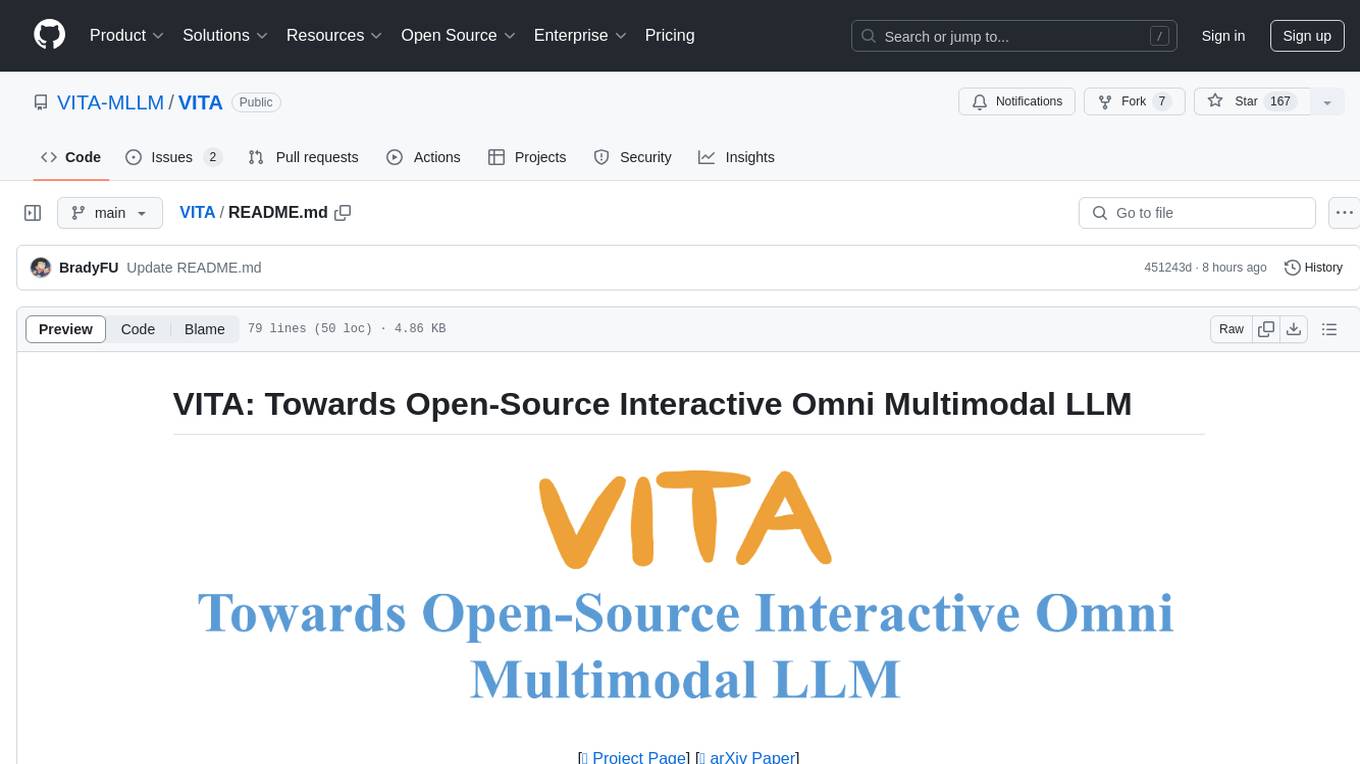
VITA
VITA is an open-source interactive omni multimodal Large Language Model (LLM) capable of processing video, image, text, and audio inputs simultaneously. It stands out with features like Omni Multimodal Understanding, Non-awakening Interaction, and Audio Interrupt Interaction. VITA can respond to user queries without a wake-up word, track and filter external queries in real-time, and handle various query inputs effectively. The model utilizes state tokens and a duplex scheme to enhance the multimodal interactive experience.
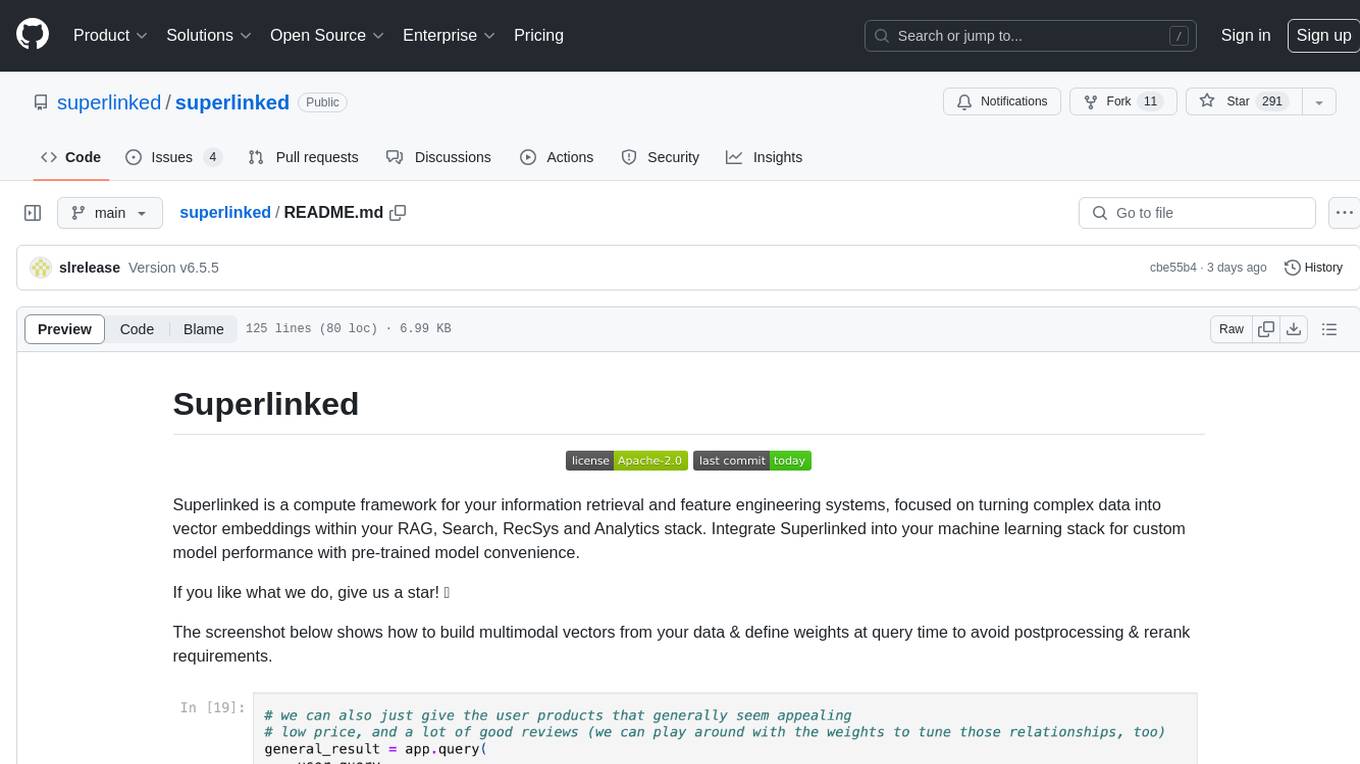
superlinked
Superlinked is a compute framework for information retrieval and feature engineering systems, focusing on converting complex data into vector embeddings for RAG, Search, RecSys, and Analytics stack integration. It enables custom model performance in machine learning with pre-trained model convenience. The tool allows users to build multimodal vectors, define weights at query time, and avoid postprocessing & rerank requirements. Users can explore the computational model through simple scripts and python notebooks, with a future release planned for production usage with built-in data infra and vector database integrations.
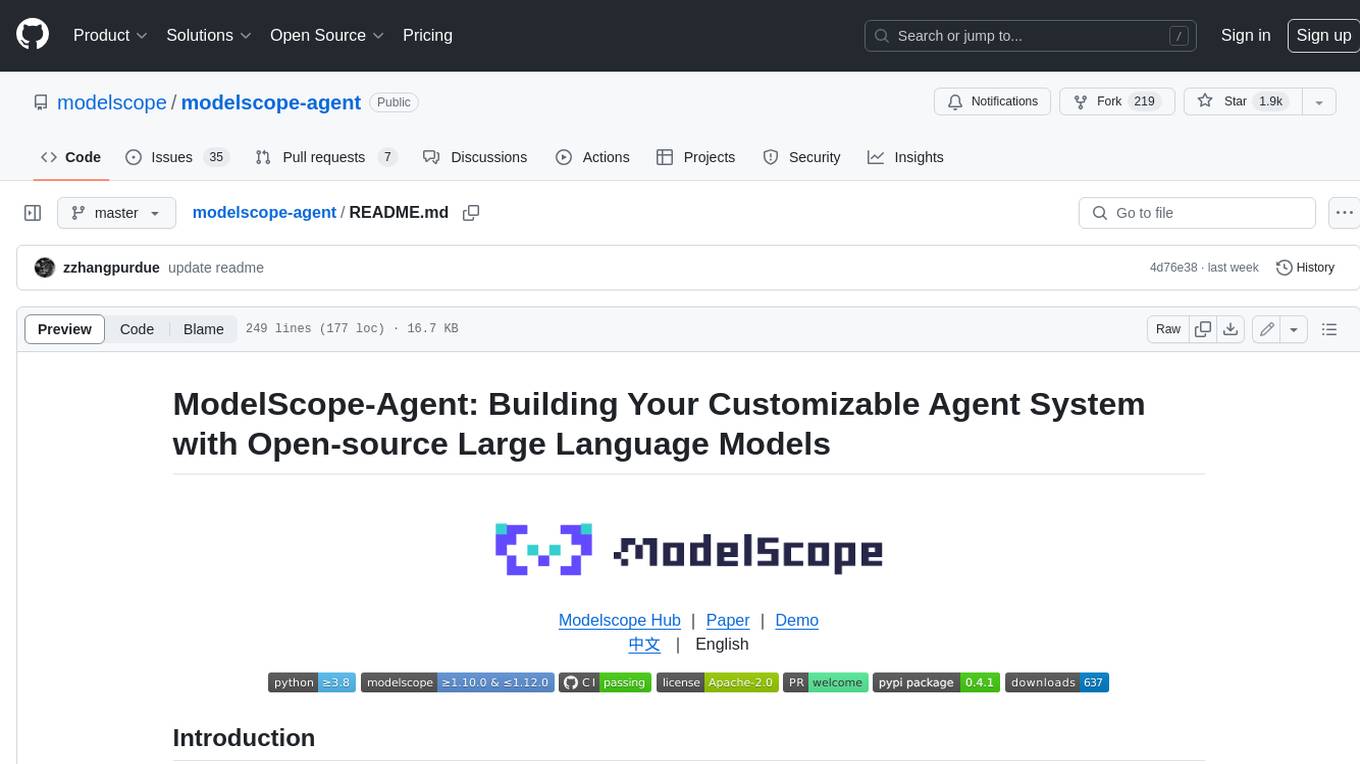
modelscope-agent
ModelScope-Agent is a customizable and scalable Agent framework. A single agent has abilities such as role-playing, LLM calling, tool usage, planning, and memory. It mainly has the following characteristics: - **Simple Agent Implementation Process**: Simply specify the role instruction, LLM name, and tool name list to implement an Agent application. The framework automatically arranges workflows for tool usage, planning, and memory. - **Rich models and tools**: The framework is equipped with rich LLM interfaces, such as Dashscope and Modelscope model interfaces, OpenAI model interfaces, etc. Built in rich tools, such as **code interpreter**, **weather query**, **text to image**, **web browsing**, etc., make it easy to customize exclusive agents. - **Unified interface and high scalability**: The framework has clear tools and LLM registration mechanism, making it convenient for users to expand more diverse Agent applications. - **Low coupling**: Developers can easily use built-in tools, LLM, memory, and other components without the need to bind higher-level agents.
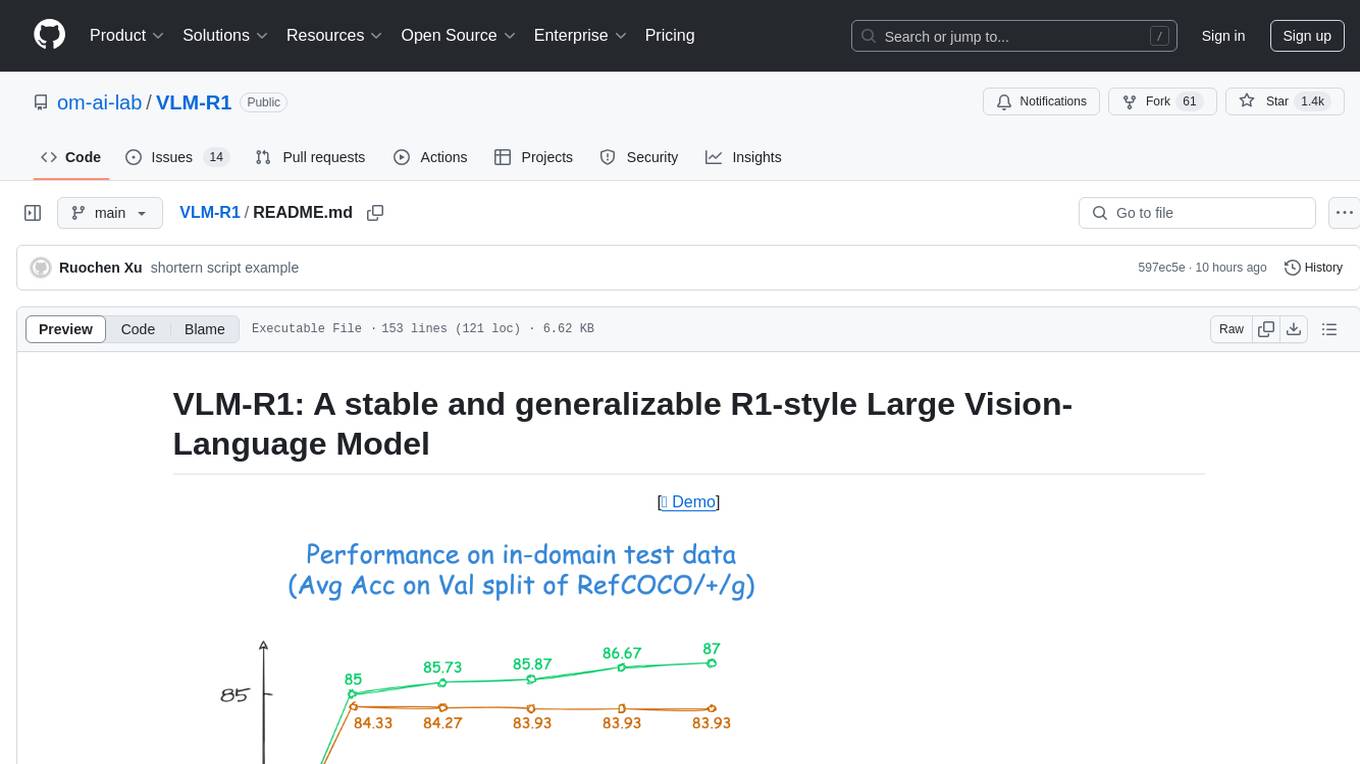
VLM-R1
VLM-R1 is a stable and generalizable R1-style Large Vision-Language Model proposed for Referring Expression Comprehension (REC) task. It compares R1 and SFT approaches, showing R1 model's steady improvement on out-of-domain test data. The project includes setup instructions, training steps for GRPO and SFT models, support for user data loading, and evaluation process. Acknowledgements to various open-source projects and resources are mentioned. The project aims to provide a reliable and versatile solution for vision-language tasks.
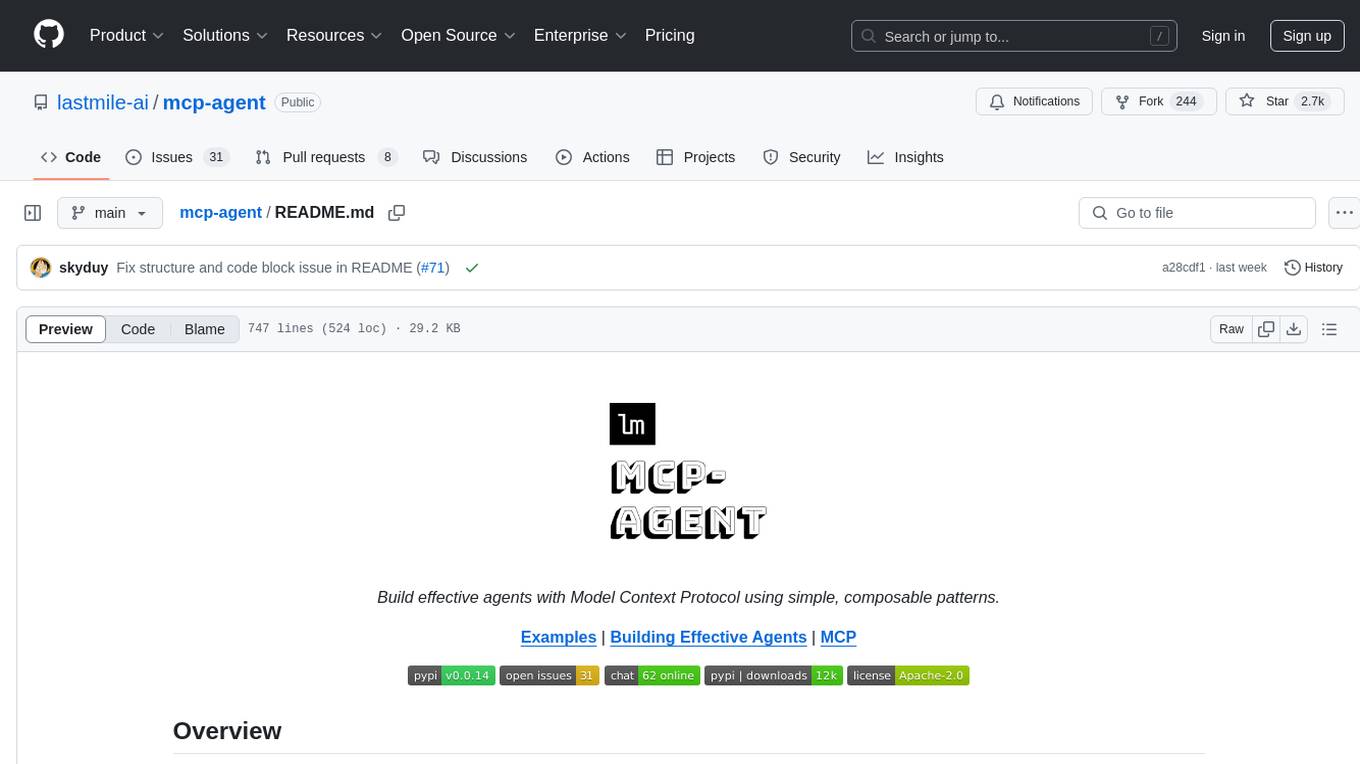
mcp-agent
mcp-agent is a simple, composable framework designed to build agents using the Model Context Protocol. It handles the lifecycle of MCP server connections and implements patterns for building production-ready AI agents in a composable way. The framework also includes OpenAI's Swarm pattern for multi-agent orchestration in a model-agnostic manner, making it the simplest way to build robust agent applications. It is purpose-built for the shared protocol MCP, lightweight, and closer to an agent pattern library than a framework. mcp-agent allows developers to focus on the core business logic of their AI applications by handling mechanics such as server connections, working with LLMs, and supporting external signals like human input.
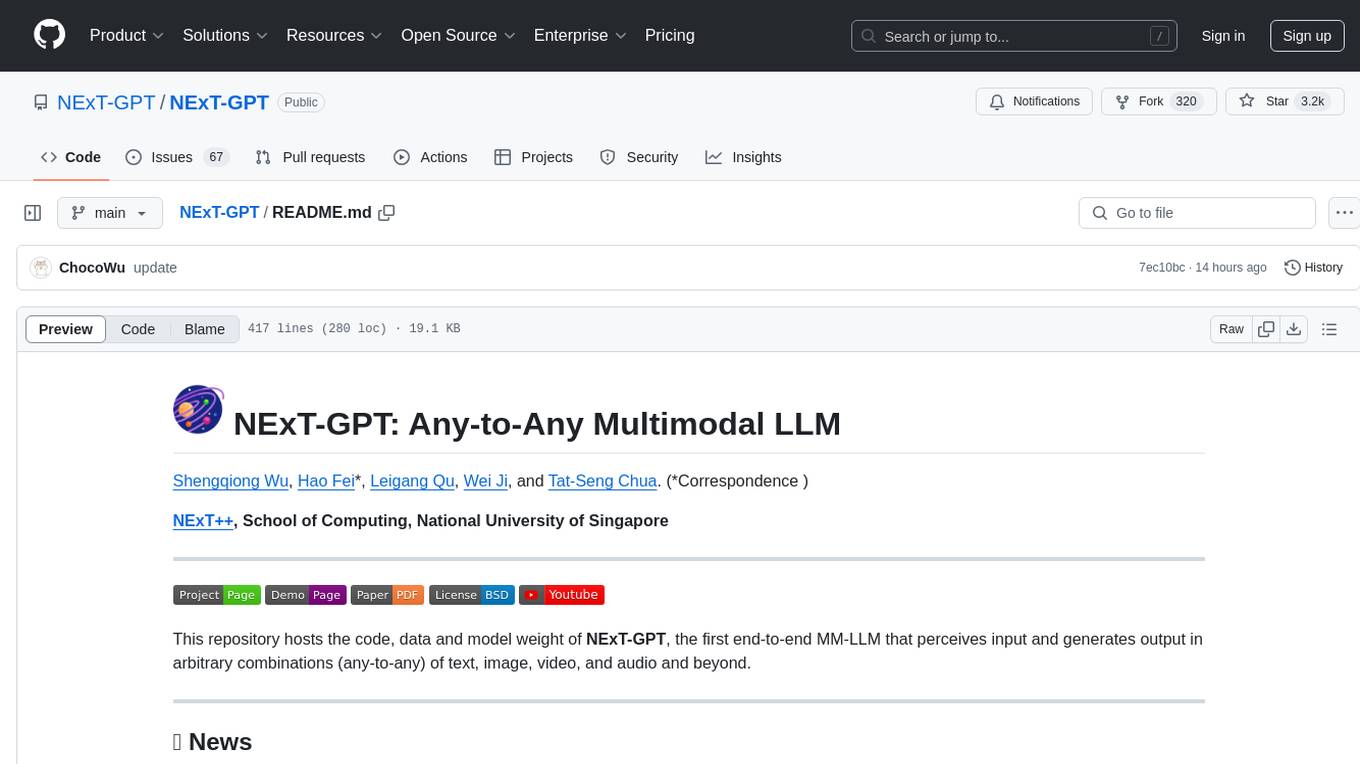
NExT-GPT
NExT-GPT is an end-to-end multimodal large language model that can process input and generate output in various combinations of text, image, video, and audio. It leverages existing pre-trained models and diffusion models with end-to-end instruction tuning. The repository contains code, data, and model weights for NExT-GPT, allowing users to work with different modalities and perform tasks like encoding, understanding, reasoning, and generating multimodal content.
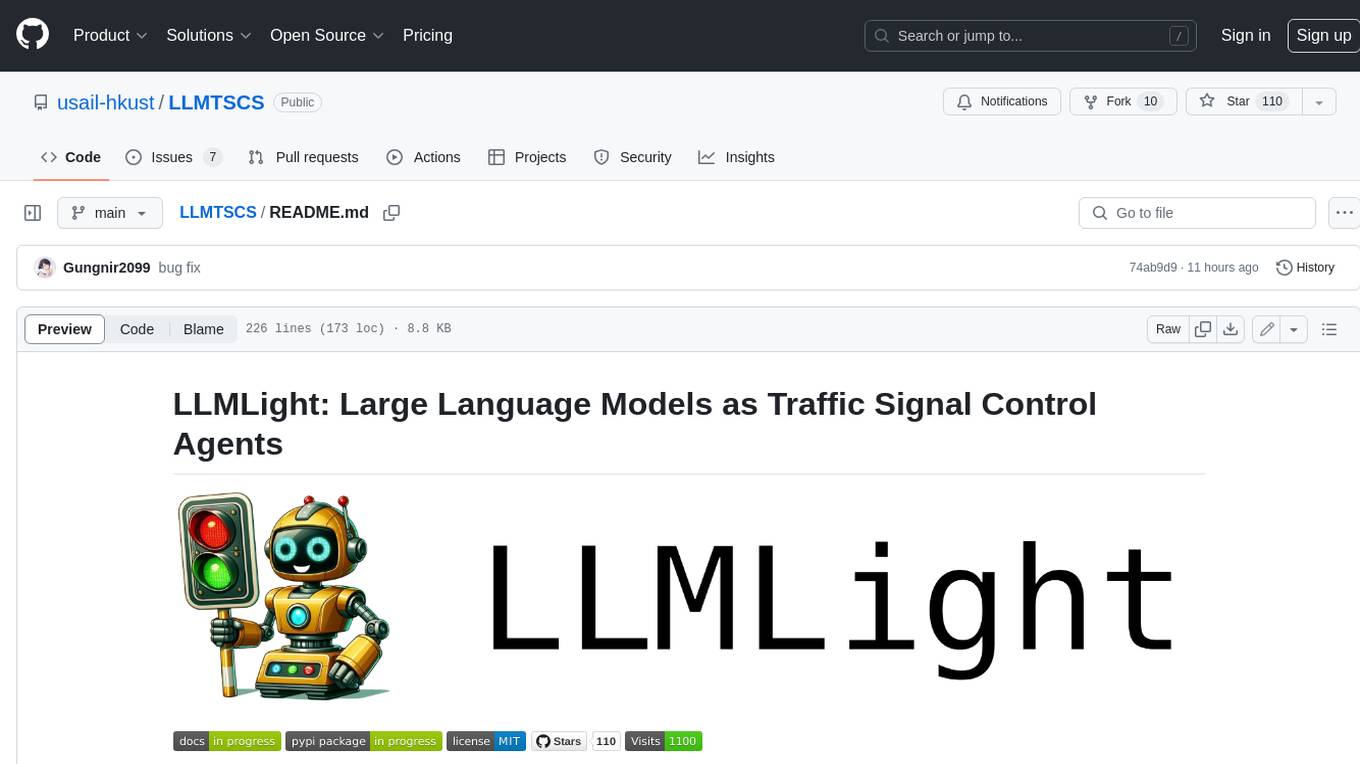
LLMTSCS
LLMLight is a novel framework that employs Large Language Models (LLMs) as decision-making agents for Traffic Signal Control (TSC). The framework leverages the advanced generalization capabilities of LLMs to engage in a reasoning and decision-making process akin to human intuition for effective traffic control. LLMLight has been demonstrated to be remarkably effective, generalizable, and interpretable against various transportation-based and RL-based baselines on nine real-world and synthetic datasets.
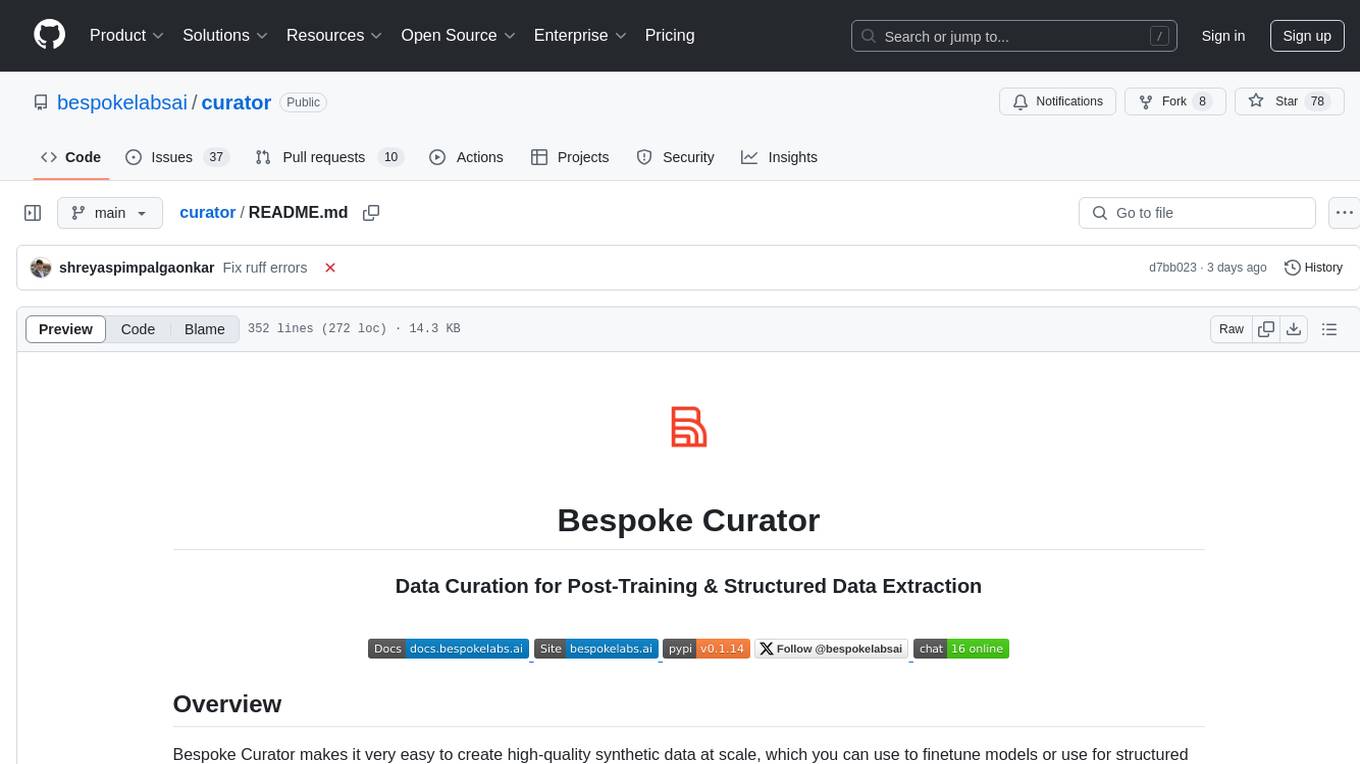
curator
Bespoke Curator is an open-source tool for data curation and structured data extraction. It provides a Python library for generating synthetic data at scale, with features like programmability, performance optimization, caching, and integration with HuggingFace Datasets. The tool includes a Curator Viewer for dataset visualization and offers a rich set of functionalities for creating and refining data generation strategies.
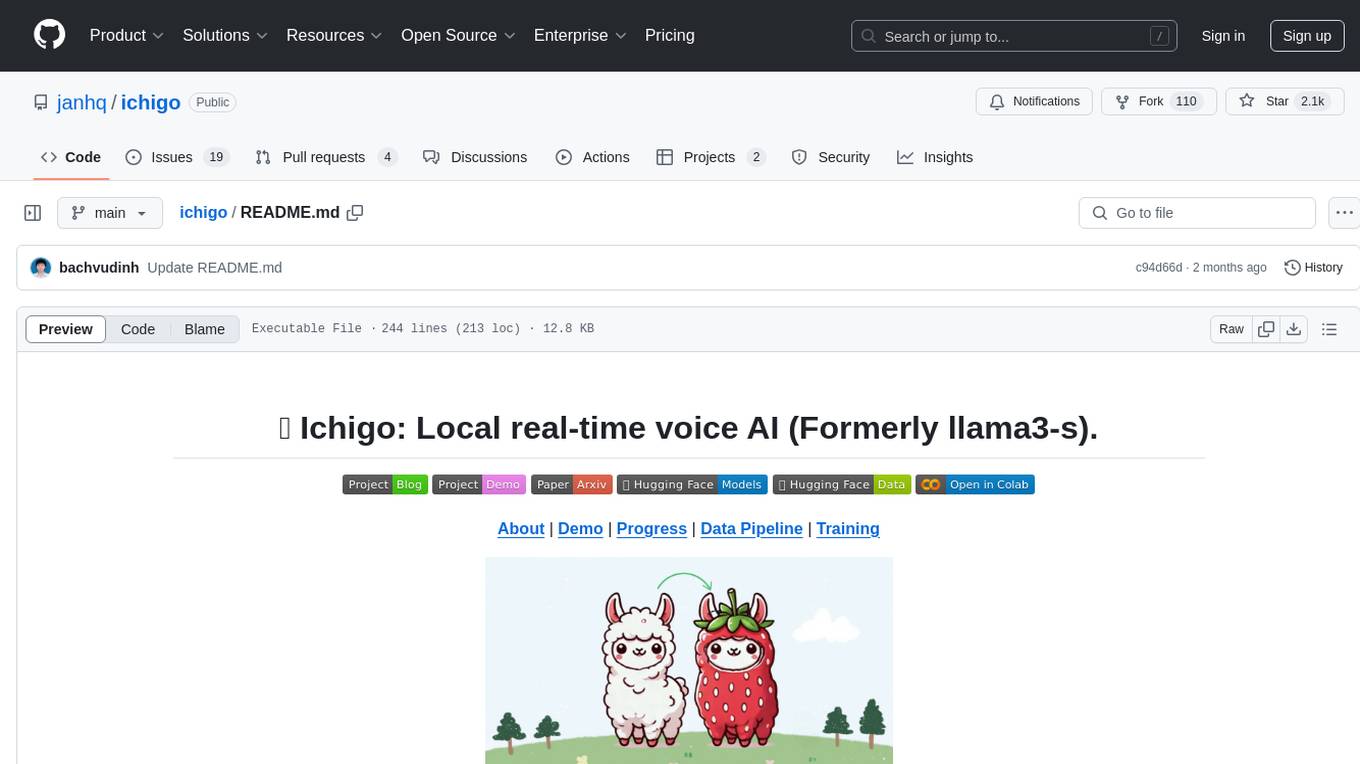
ichigo
Ichigo is a local real-time voice AI tool that uses an early fusion technique to extend a text-based LLM to have native 'listening' ability. It is an open research experiment with improved multiturn capabilities and the ability to refuse processing inaudible queries. The tool is designed for open data, open weight, on-device Siri-like functionality, inspired by Meta's Chameleon paper. Ichigo offers a web UI demo and Gradio web UI for users to interact with the tool. It has achieved enhanced MMLU scores, stronger context handling, advanced noise management, and improved multi-turn capabilities for a robust user experience.
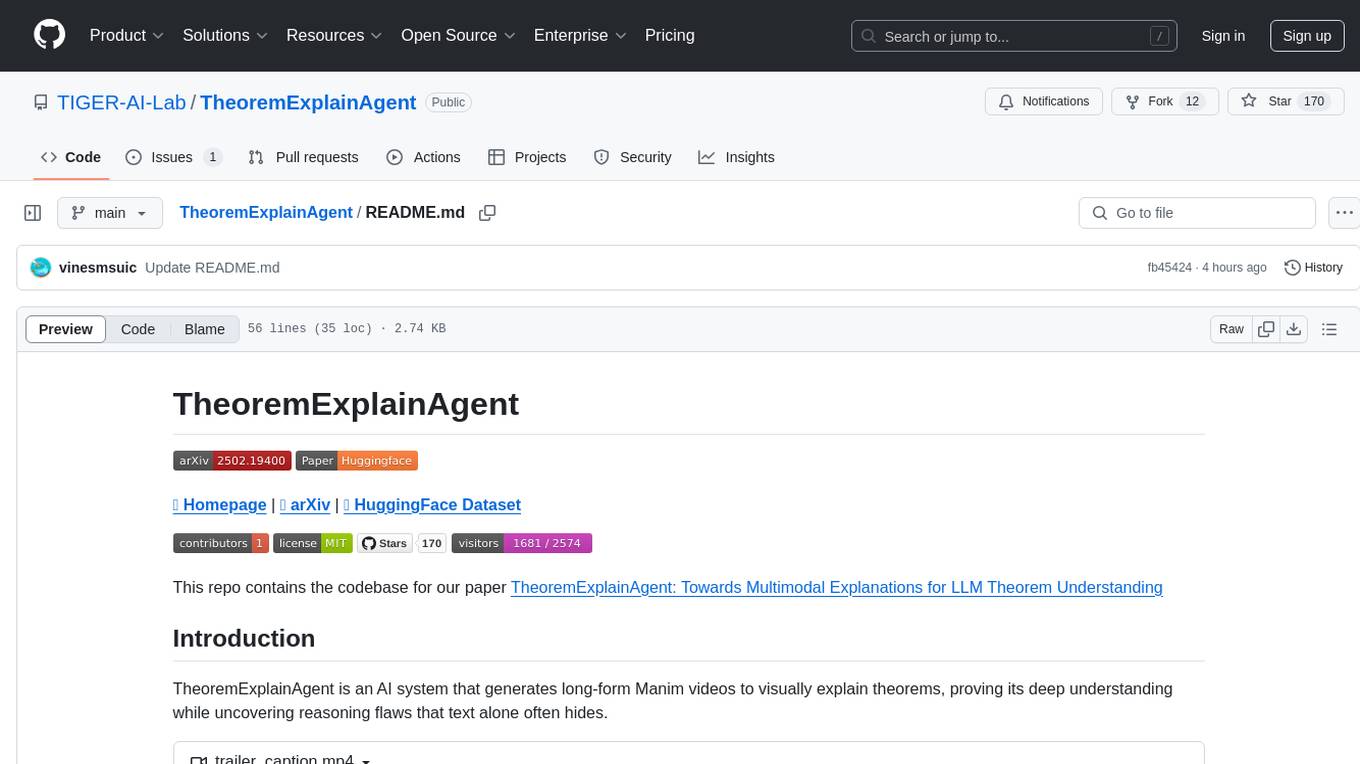
TheoremExplainAgent
TheoremExplainAgent is an AI system that generates long-form Manim videos to visually explain theorems, proving its deep understanding while uncovering reasoning flaws that text alone often hides. The codebase for the paper 'TheoremExplainAgent: Towards Multimodal Explanations for LLM Theorem Understanding' is available in this repository. It provides a tool for creating multimodal explanations for theorem understanding using AI technology.
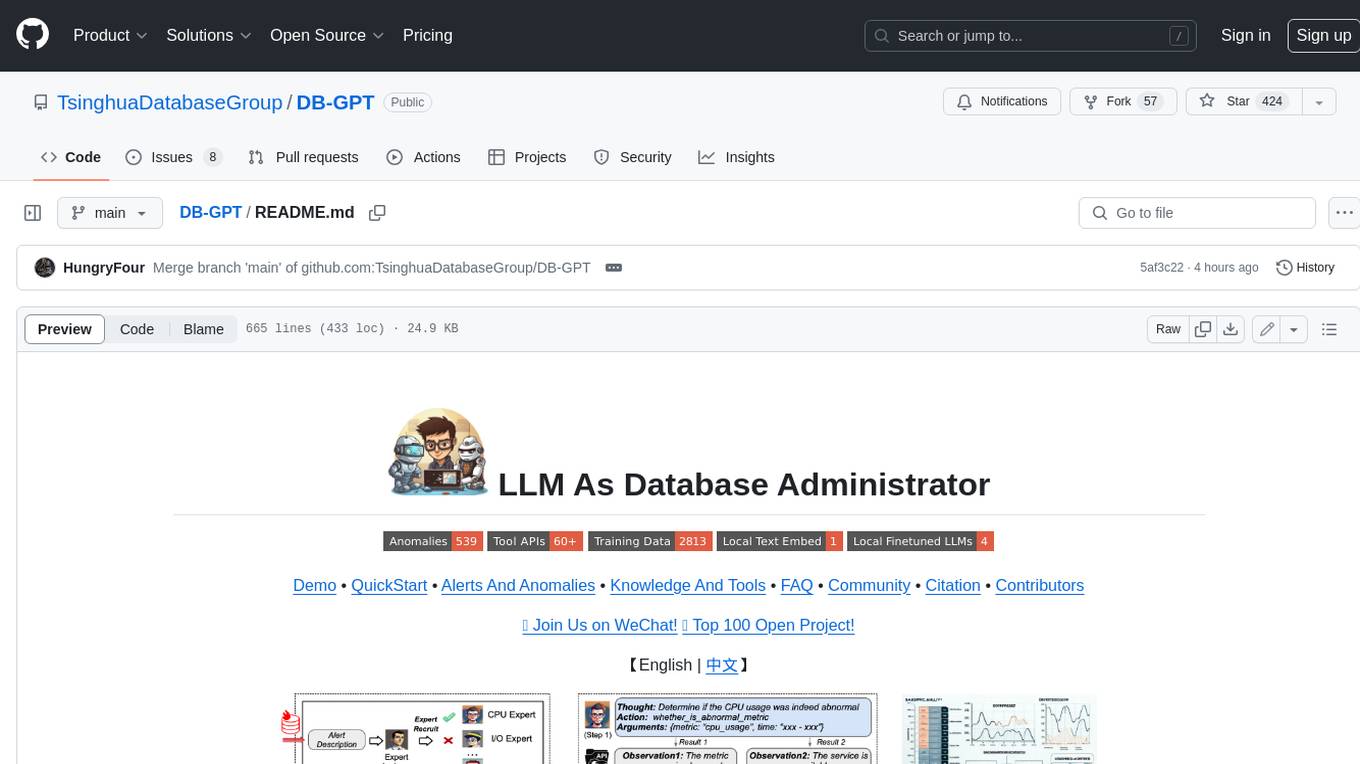
DB-GPT
DB-GPT is a personal database administrator that can solve database problems by reading documents, using various tools, and writing analysis reports. It is currently undergoing an upgrade. **Features:** * **Online Demo:** * Import documents into the knowledge base * Utilize the knowledge base for well-founded Q&A and diagnosis analysis of abnormal alarms * Send feedbacks to refine the intermediate diagnosis results * Edit the diagnosis result * Browse all historical diagnosis results, used metrics, and detailed diagnosis processes * **Language Support:** * English (default) * Chinese (add "language: zh" in config.yaml) * **New Frontend:** * Knowledgebase + Chat Q&A + Diagnosis + Report Replay * **Extreme Speed Version for localized llms:** * 4-bit quantized LLM (reducing inference time by 1/3) * vllm for fast inference (qwen) * Tiny LLM * **Multi-path extraction of document knowledge:** * Vector database (ChromaDB) * RESTful Search Engine (Elasticsearch) * **Expert prompt generation using document knowledge** * **Upgrade the LLM-based diagnosis mechanism:** * Task Dispatching -> Concurrent Diagnosis -> Cross Review -> Report Generation * Synchronous Concurrency Mechanism during LLM inference * **Support monitoring and optimization tools in multiple levels:** * Monitoring metrics (Prometheus) * Flame graph in code level * Diagnosis knowledge retrieval (dbmind) * Logical query transformations (Calcite) * Index optimization algorithms (for PostgreSQL) * Physical operator hints (for PostgreSQL) * Backup and Point-in-time Recovery (Pigsty) * **Continuously updated papers and experimental reports** This project is constantly evolving with new features. Don't forget to star ⭐ and watch 👀 to stay up to date.
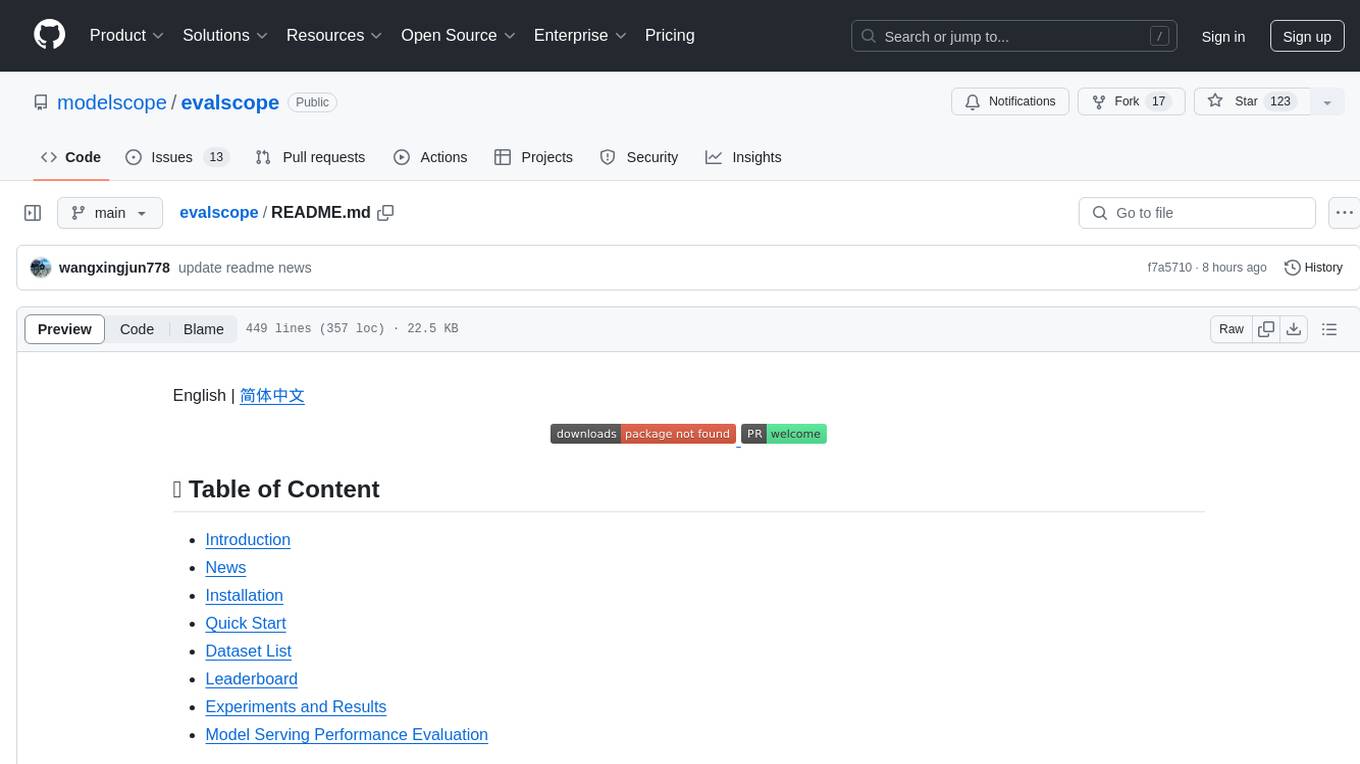
evalscope
Eval-Scope is a framework designed to support the evaluation of large language models (LLMs) by providing pre-configured benchmark datasets, common evaluation metrics, model integration, automatic evaluation for objective questions, complex task evaluation using expert models, reports generation, visualization tools, and model inference performance evaluation. It is lightweight, easy to customize, supports new dataset integration, model hosting on ModelScope, deployment of locally hosted models, and rich evaluation metrics. Eval-Scope also supports various evaluation modes like single mode, pairwise-baseline mode, and pairwise (all) mode, making it suitable for assessing and improving LLMs.
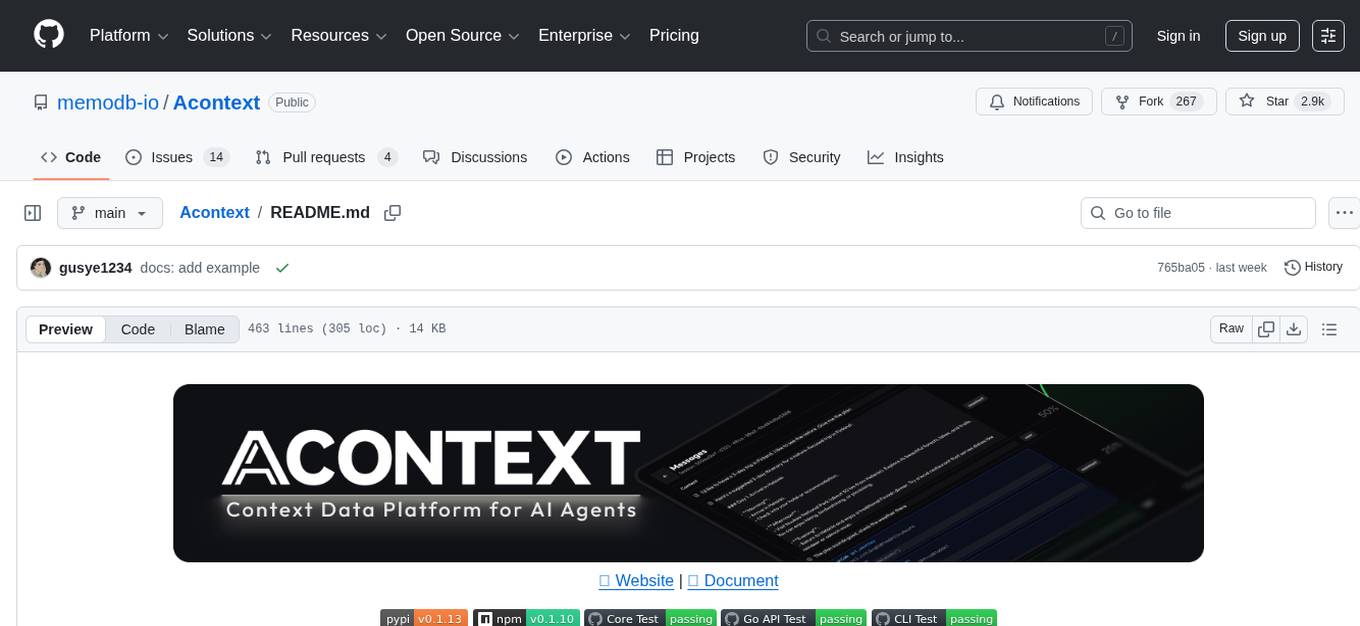
Acontext
Acontext is a context data platform designed for production AI agents, offering unified storage, built-in context management, and observability features. It helps agents scale from local demos to production without the need to rebuild context infrastructure. The platform provides solutions for challenges like scattered context data, long-running agents requiring context management, and tracking states from multi-modal agents. Acontext offers core features such as context storage, session management, disk storage, agent skills management, and sandbox for code execution and analysis. Users can connect to Acontext, install SDKs, initialize clients, store and retrieve messages, perform context engineering, and utilize agent storage tools. The platform also supports building agents using end-to-end scripts in Python and Typescript, with various templates available. Acontext's architecture includes client layer, backend with API and core components, infrastructure with PostgreSQL, S3, Redis, and RabbitMQ, and a web dashboard. Join the Acontext community on Discord and follow updates on GitHub.

rl
TorchRL is an open-source Reinforcement Learning (RL) library for PyTorch. It provides pytorch and **python-first** , low and high level abstractions for RL that are intended to be **efficient** , **modular** , **documented** and properly **tested**. The code is aimed at supporting research in RL. Most of it is written in python in a highly modular way, such that researchers can easily swap components, transform them or write new ones with little effort.
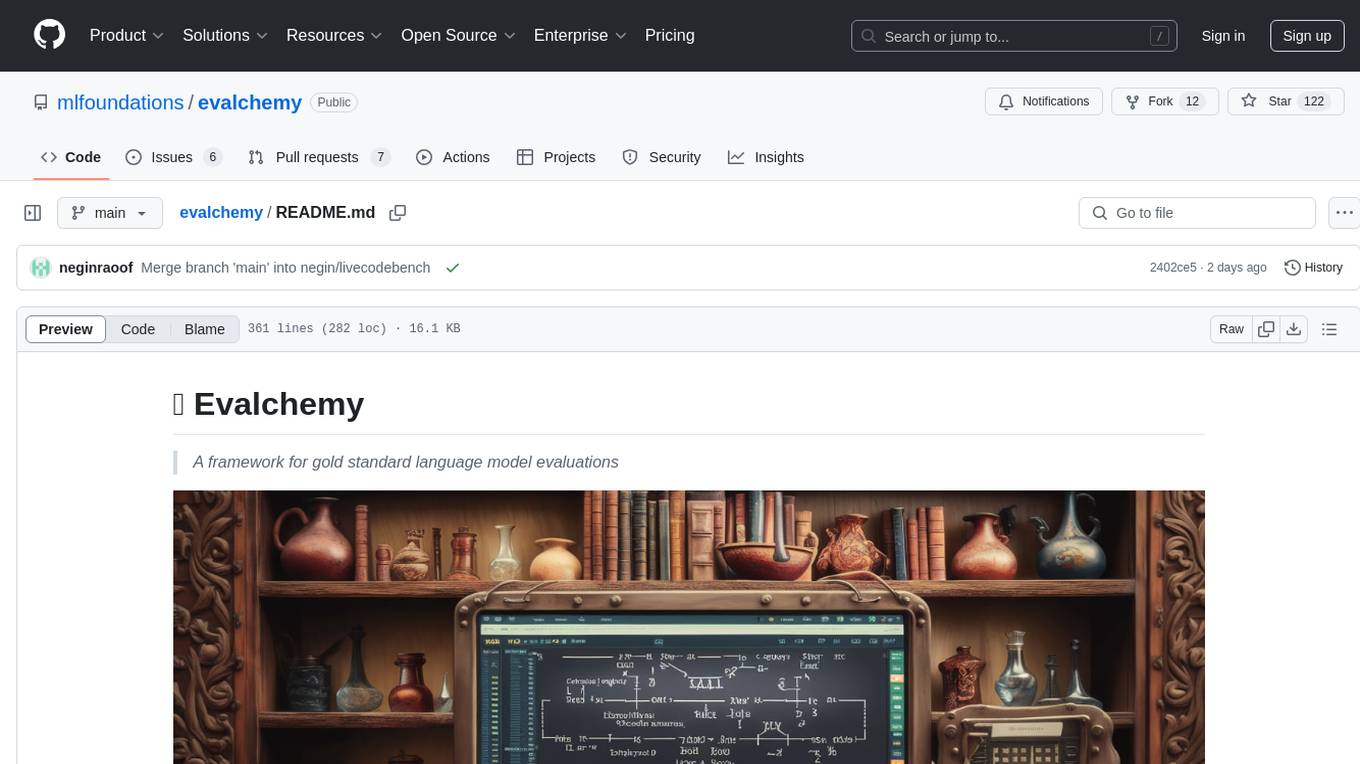
evalchemy
Evalchemy is a unified and easy-to-use toolkit for evaluating language models, focusing on post-trained models. It integrates multiple existing benchmarks such as RepoBench, AlpacaEval, and ZeroEval. Key features include unified installation, parallel evaluation, simplified usage, and results management. Users can run various benchmarks with a consistent command-line interface and track results locally or integrate with a database for systematic tracking and leaderboard submission.
For similar tasks

DeepResearch
Tongyi DeepResearch is an agentic large language model with 30.5 billion total parameters, designed for long-horizon, deep information-seeking tasks. It demonstrates state-of-the-art performance across various search benchmarks. The model features a fully automated synthetic data generation pipeline, large-scale continual pre-training on agentic data, end-to-end reinforcement learning, and compatibility with two inference paradigms. Users can download the model directly from HuggingFace or ModelScope. The repository also provides benchmark evaluation scripts and information on the Deep Research Agent Family.
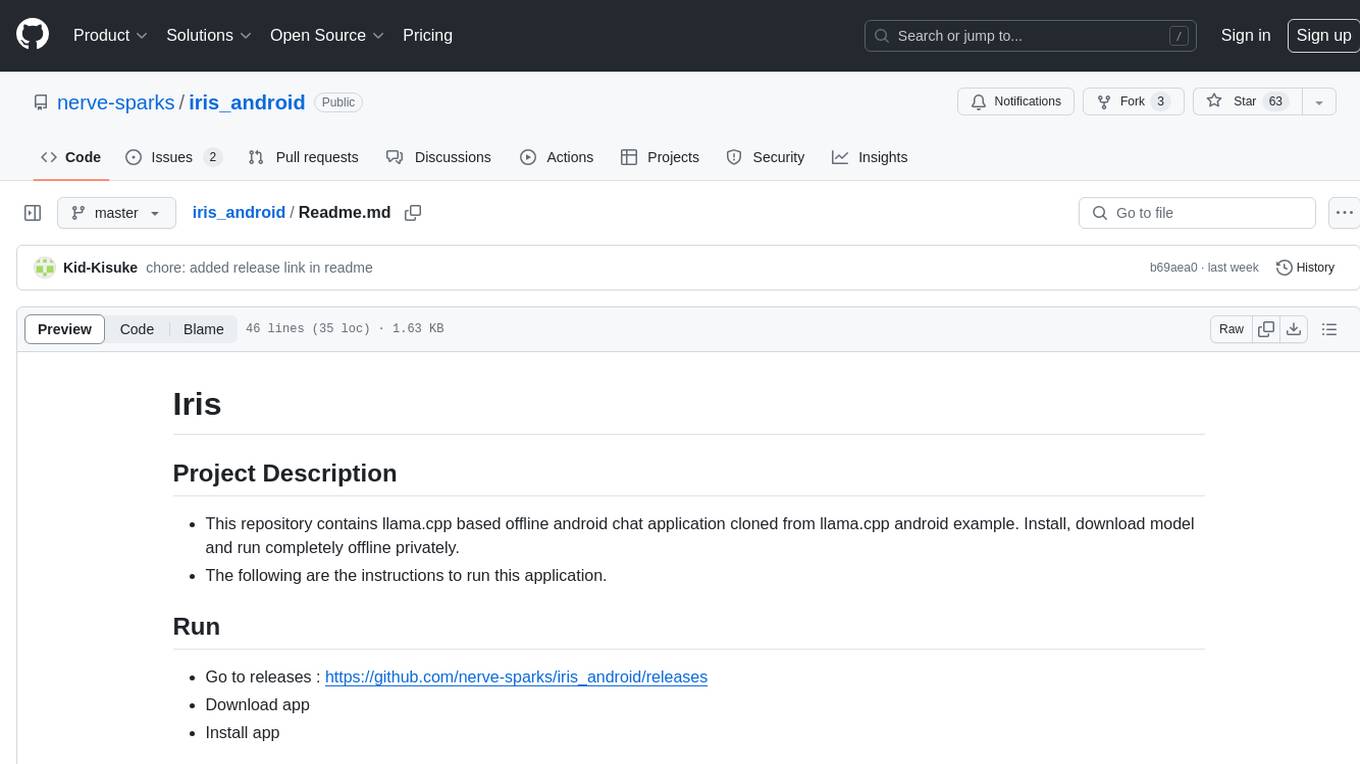
iris_android
This repository contains an offline Android chat application based on llama.cpp example. Users can install, download models, and run the app completely offline and privately. To use the app, users need to go to the releases page, download and install the app. Building the app requires downloading Android Studio, cloning the repository, and importing it into Android Studio. The app can be run offline by following specific steps such as enabling developer options, wireless debugging, and downloading the stable LM model. The project is maintained by Nerve Sparks and contributions are welcome through creating feature branches and pull requests.
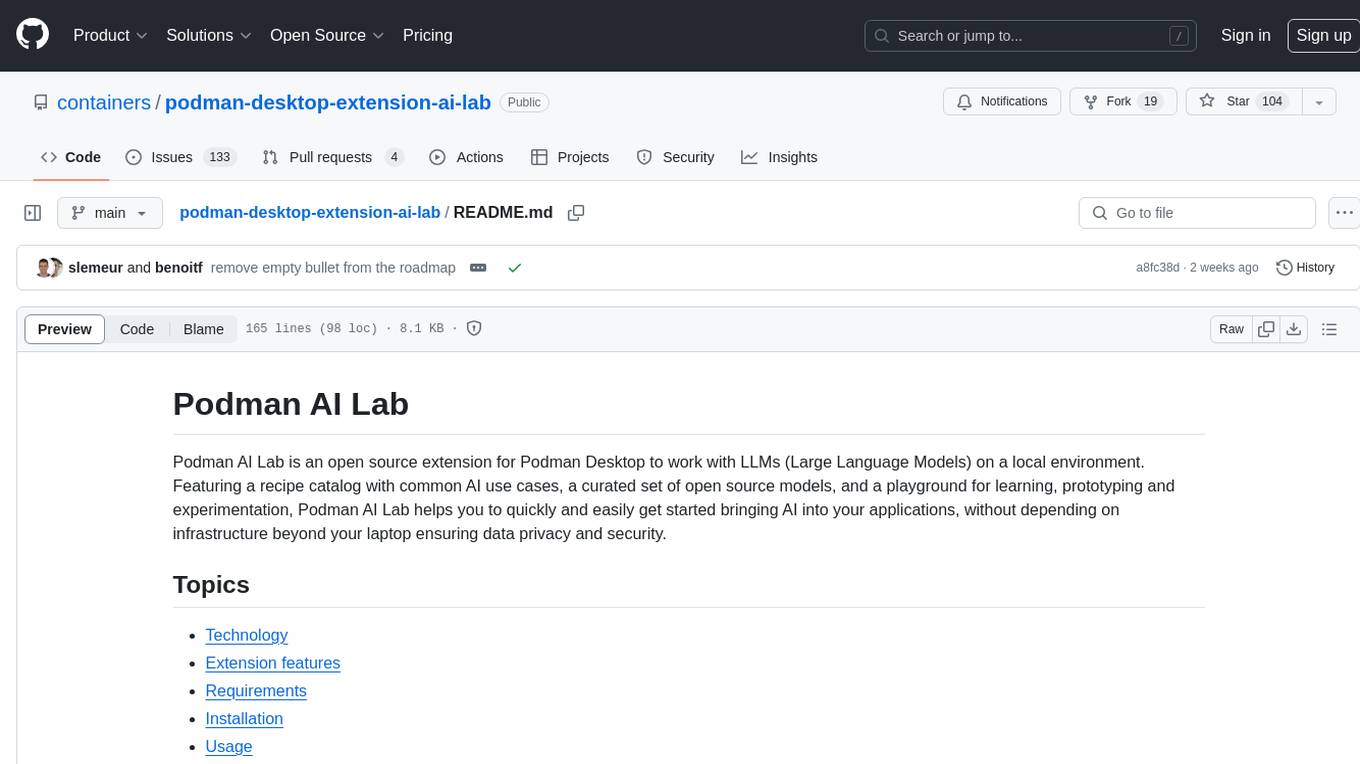
podman-desktop-extension-ai-lab
Podman AI Lab is an open source extension for Podman Desktop designed to work with Large Language Models (LLMs) on a local environment. It features a recipe catalog with common AI use cases, a curated set of open source models, and a playground for learning, prototyping, and experimentation. Users can quickly and easily get started bringing AI into their applications without depending on external infrastructure, ensuring data privacy and security.
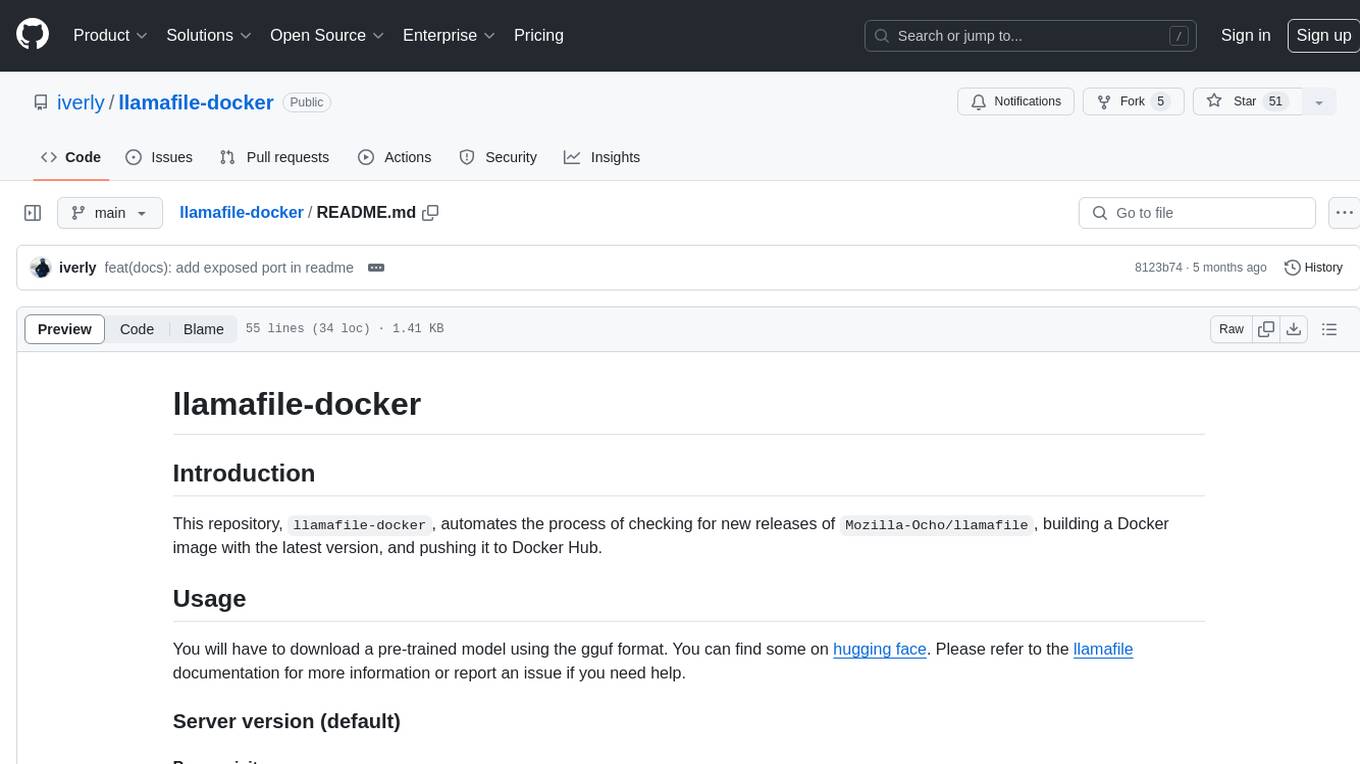
llamafile-docker
This repository, llamafile-docker, automates the process of checking for new releases of Mozilla-Ocho/llamafile, building a Docker image with the latest version, and pushing it to Docker Hub. Users can download a pre-trained model in gguf format and use the Docker image to interact with the model via a server or CLI version. Contributions are welcome under the Apache 2.0 license.
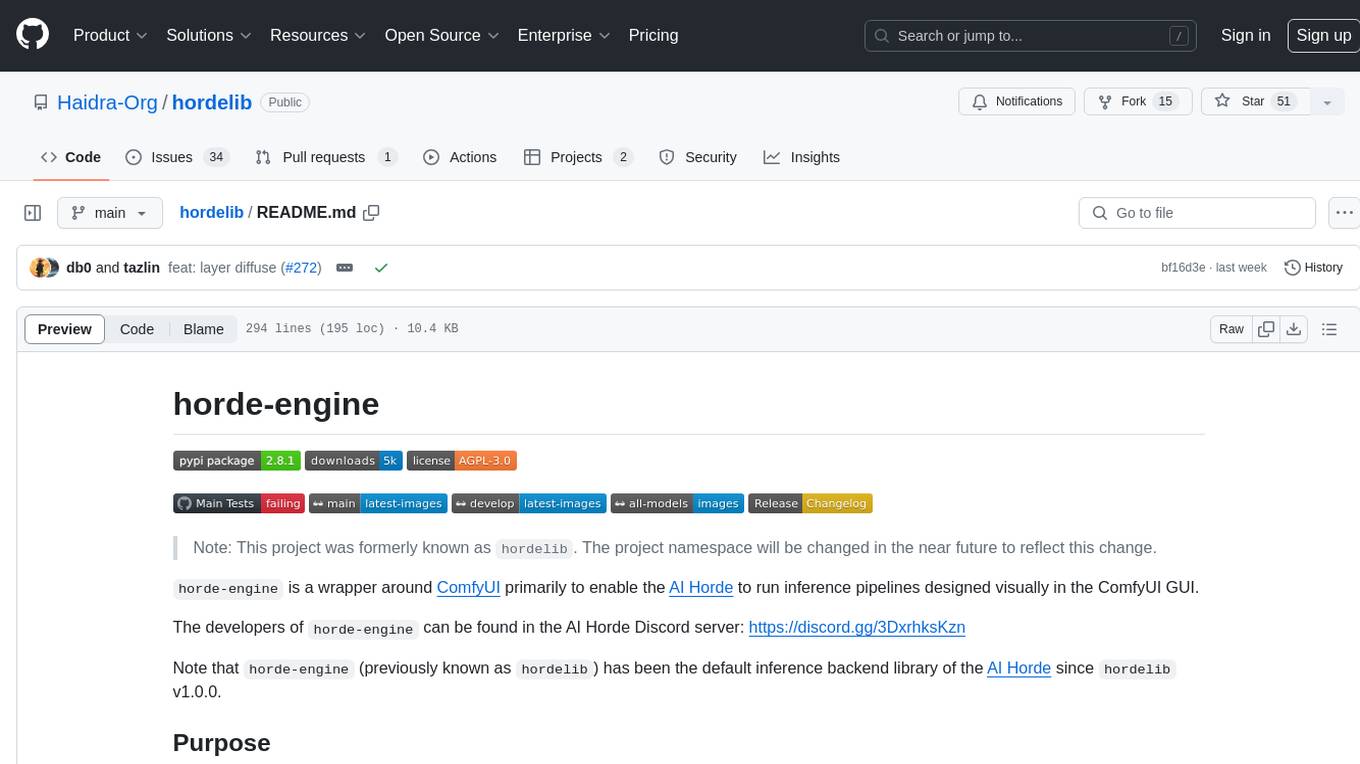
hordelib
horde-engine is a wrapper around ComfyUI designed to run inference pipelines visually designed in the ComfyUI GUI. It enables users to design inference pipelines in ComfyUI and then call them programmatically, maintaining compatibility with the existing horde implementation. The library provides features for processing Horde payloads, initializing the library, downloading and validating models, and generating images based on input data. It also includes custom nodes for preprocessing and tasks such as face restoration and QR code generation. The project depends on various open source projects and bundles some dependencies within the library itself. Users can design ComfyUI pipelines, convert them to the backend format, and run them using the run_image_pipeline() method in hordelib.comfy.Comfy(). The project is actively developed and tested using git, tox, and a specific model directory structure.
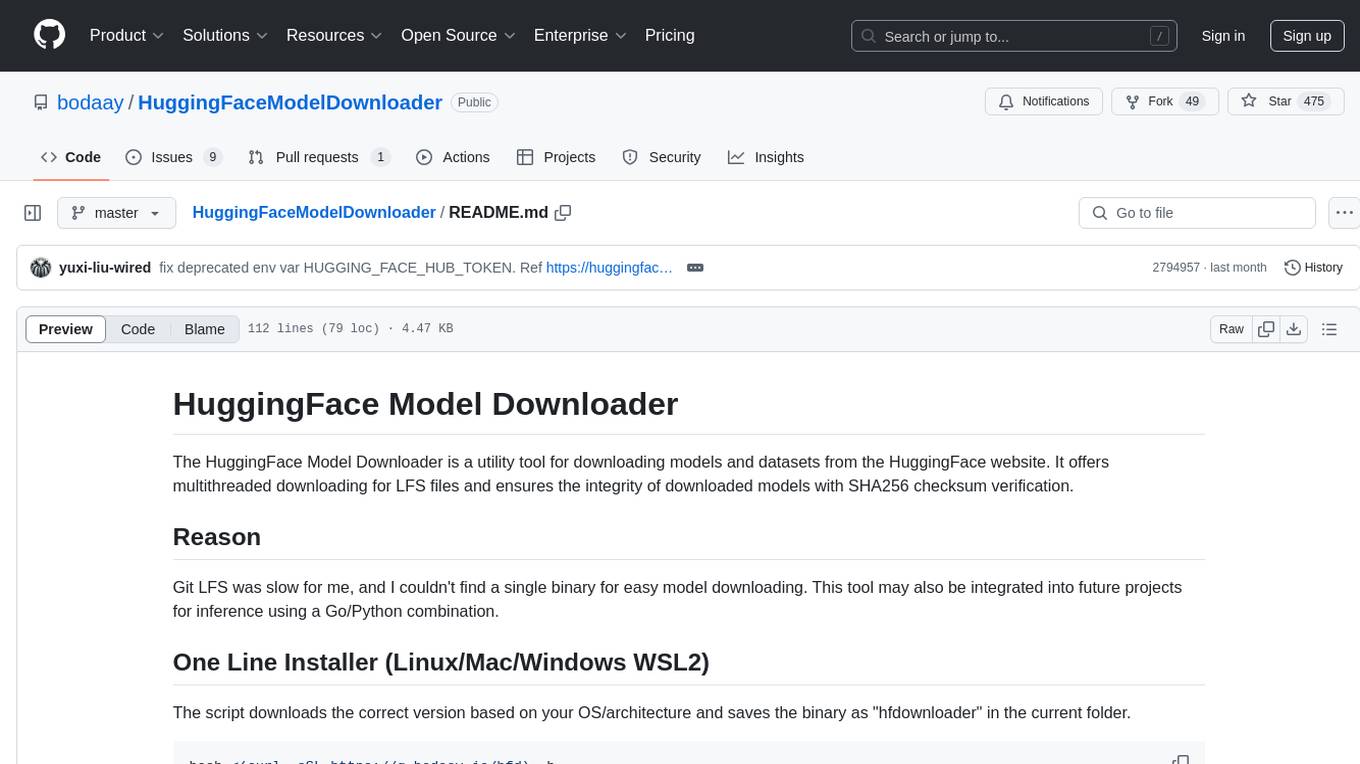
HuggingFaceModelDownloader
The HuggingFace Model Downloader is a utility tool for downloading models and datasets from the HuggingFace website. It offers multithreaded downloading for LFS files and ensures the integrity of downloaded models with SHA256 checksum verification. The tool provides features such as nested file downloading, filter downloads for specific LFS model files, support for HuggingFace Access Token, and configuration file support. It can be used as a library or a single binary for easy model downloading and inference in projects.
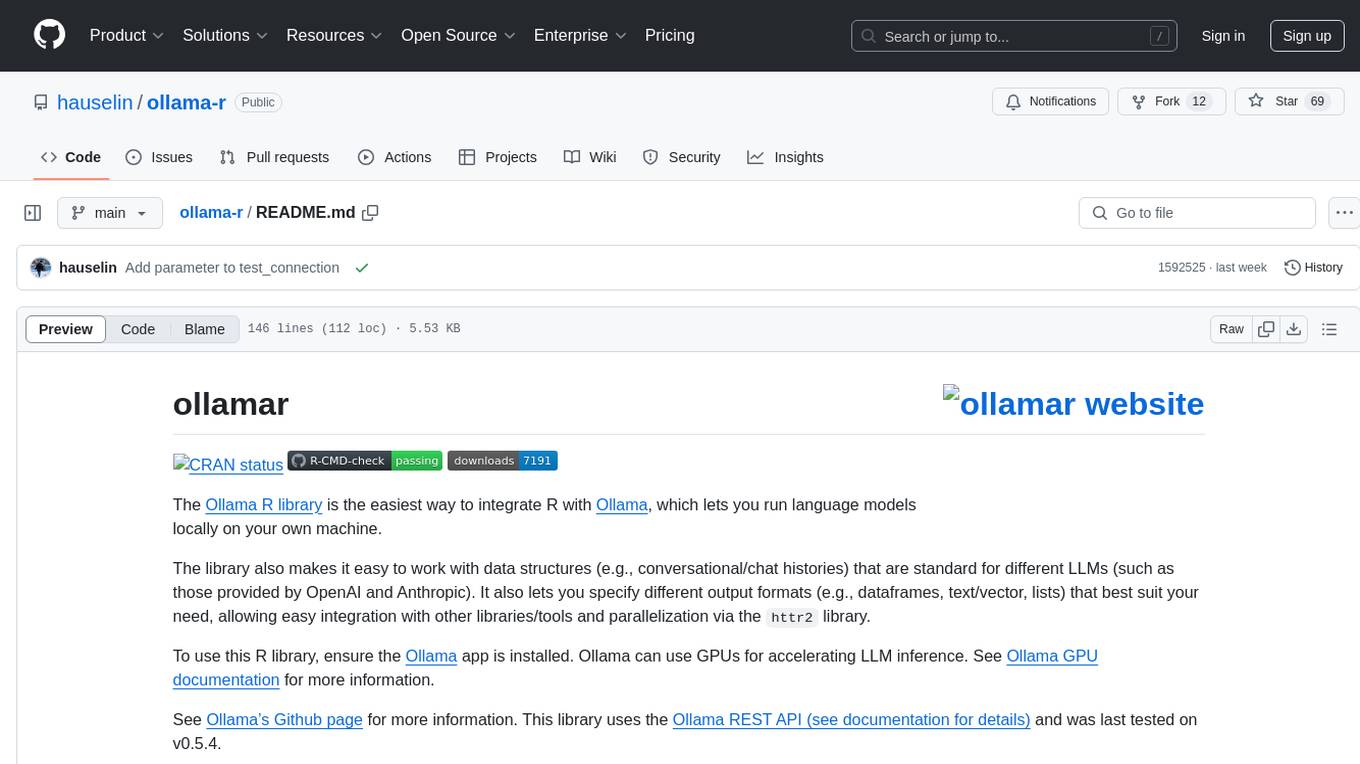
ollama-r
The Ollama R library provides an easy way to integrate R with Ollama for running language models locally on your machine. It supports working with standard data structures for different LLMs, offers various output formats, and enables integration with other libraries/tools. The library uses the Ollama REST API and requires the Ollama app to be installed, with GPU support for accelerating LLM inference. It is inspired by Ollama Python and JavaScript libraries, making it familiar for users of those languages. The installation process involves downloading the Ollama app, installing the 'ollamar' package, and starting the local server. Example usage includes testing connection, downloading models, generating responses, and listing available models.

djl
Deep Java Library (DJL) is an open-source, high-level, engine-agnostic Java framework for deep learning. It is designed to be easy to get started with and simple to use for Java developers. DJL provides a native Java development experience and allows users to integrate machine learning and deep learning models with their Java applications. The framework is deep learning engine agnostic, enabling users to switch engines at any point for optimal performance. DJL's ergonomic API interface guides users with best practices to accomplish deep learning tasks, such as running inference and training neural networks.
For similar jobs

weave
Weave is a toolkit for developing Generative AI applications, built by Weights & Biases. With Weave, you can log and debug language model inputs, outputs, and traces; build rigorous, apples-to-apples evaluations for language model use cases; and organize all the information generated across the LLM workflow, from experimentation to evaluations to production. Weave aims to bring rigor, best-practices, and composability to the inherently experimental process of developing Generative AI software, without introducing cognitive overhead.

agentcloud
AgentCloud is an open-source platform that enables companies to build and deploy private LLM chat apps, empowering teams to securely interact with their data. It comprises three main components: Agent Backend, Webapp, and Vector Proxy. To run this project locally, clone the repository, install Docker, and start the services. The project is licensed under the GNU Affero General Public License, version 3 only. Contributions and feedback are welcome from the community.

VisionCraft
The VisionCraft API is a free API for using over 100 different AI models. From images to sound.

kaito
Kaito is an operator that automates the AI/ML inference model deployment in a Kubernetes cluster. It manages large model files using container images, avoids tuning deployment parameters to fit GPU hardware by providing preset configurations, auto-provisions GPU nodes based on model requirements, and hosts large model images in the public Microsoft Container Registry (MCR) if the license allows. Using Kaito, the workflow of onboarding large AI inference models in Kubernetes is largely simplified.

Azure-Analytics-and-AI-Engagement
The Azure-Analytics-and-AI-Engagement repository provides packaged Industry Scenario DREAM Demos with ARM templates (Containing a demo web application, Power BI reports, Synapse resources, AML Notebooks etc.) that can be deployed in a customer’s subscription using the CAPE tool within a matter of few hours. Partners can also deploy DREAM Demos in their own subscriptions using DPoC.
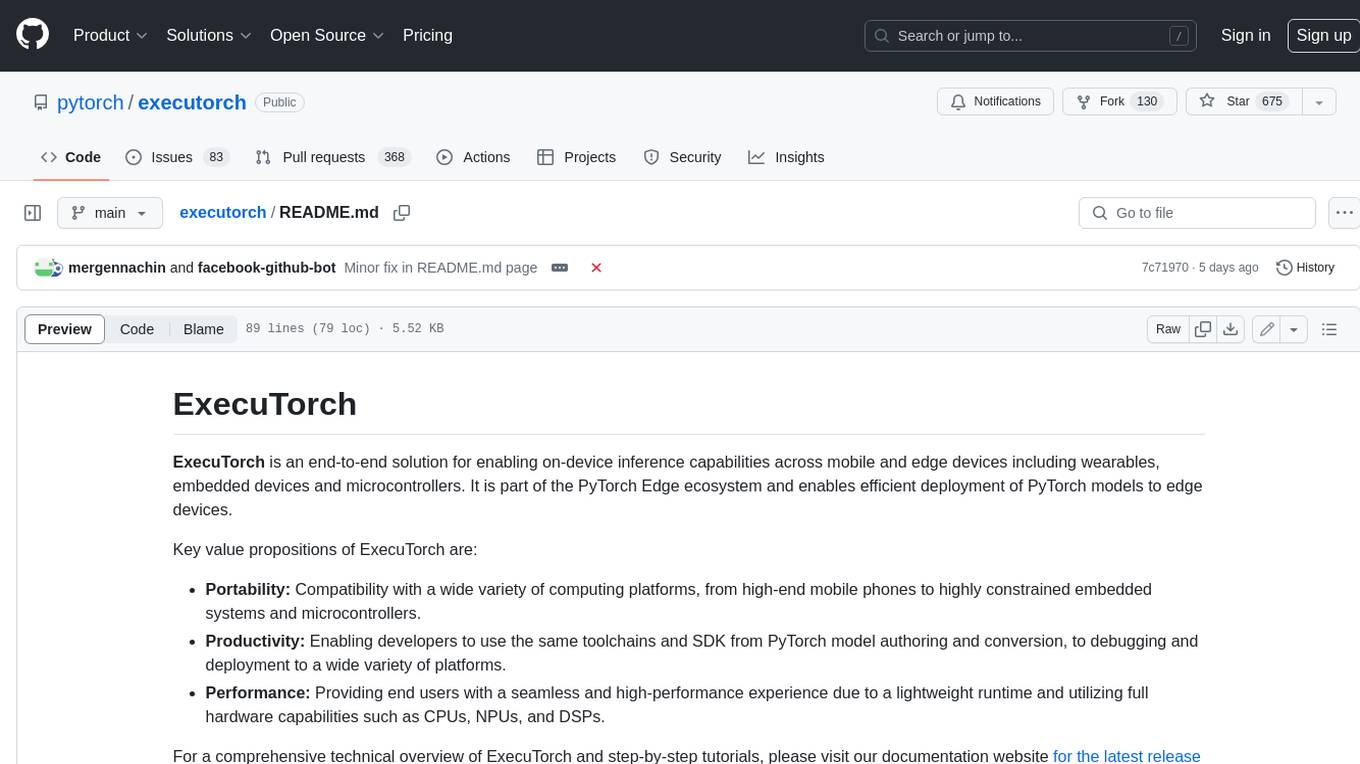
executorch
ExecuTorch is an end-to-end solution for enabling on-device inference capabilities across mobile and edge devices including wearables, embedded devices and microcontrollers. It is part of the PyTorch Edge ecosystem and enables efficient deployment of PyTorch models to edge devices. Key value propositions of ExecuTorch are: * **Portability:** Compatibility with a wide variety of computing platforms, from high-end mobile phones to highly constrained embedded systems and microcontrollers. * **Productivity:** Enabling developers to use the same toolchains and SDK from PyTorch model authoring and conversion, to debugging and deployment to a wide variety of platforms. * **Performance:** Providing end users with a seamless and high-performance experience due to a lightweight runtime and utilizing full hardware capabilities such as CPUs, NPUs, and DSPs.

autogen
AutoGen is a framework that enables the development of LLM applications using multiple agents that can converse with each other to solve tasks. AutoGen agents are customizable, conversable, and seamlessly allow human participation. They can operate in various modes that employ combinations of LLMs, human inputs, and tools.

tabby
Tabby is a self-hosted AI coding assistant, offering an open-source and on-premises alternative to GitHub Copilot. It boasts several key features: * Self-contained, with no need for a DBMS or cloud service. * OpenAPI interface, easy to integrate with existing infrastructure (e.g Cloud IDE). * Supports consumer-grade GPUs.






